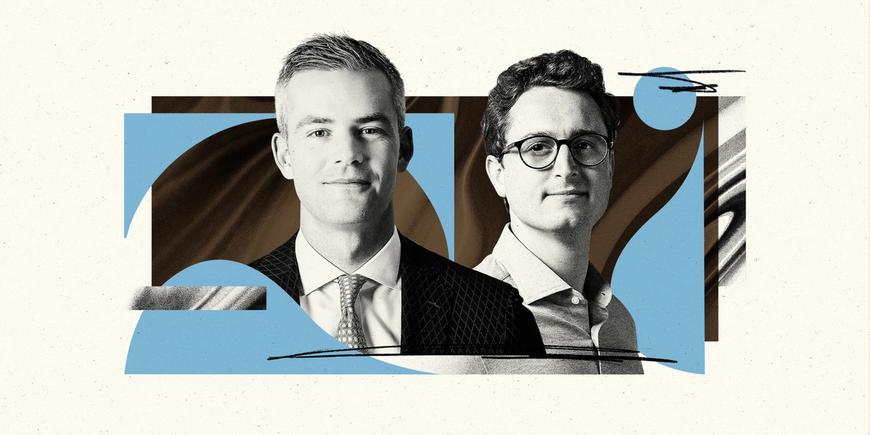Ryan Serhant on Being Real in Real Estate
The real estate broker, CEO, actor, and investor traces the similarities between selling a home and a show—and the promising integrations of AI and brokering.

Ryan Serhant is a polymath, with deep expertise across multi-million dollar New York City real estate, media, technology, and education, and television. The broker’s rise since Million Dollar Listing New York has been no small feat, with the debut of on-demand sales training platform Sellit.com and his own real estate brokerage, SERHANT.
Our deep dive navigated across AI, scaling businesses, and leveraging acting skills in sales can be heard in full on YouTube, but below, we’ve distilled our conversation to a few key highlights.
You work across real estate and entrepreneurship, but you were originally an actor. How did acting help you with getting to where you are now?
I was in school for acting for 20 years and performed everywhere. I did As the World Turns for a while, but they killed me off. I was in While We’re Young, the Ben Stiller movie in 2014, too.
The key has always been to listen and respond instead of reply. Most people have something to say, so they’ll listen just to reply. If I didn't know that, I'd be sitting here waiting for your next question. I wouldn't actually hear it, either. I’d be thinking about what I'm going to say to you next, because I’m waiting for the spotlight.
When you're an actor, you can't do that. You can tell when someone's a bad actor, often because they're spotlighting. It comes off as gross, fake, and soapy.
Sales is the same thing. You have to listen and respond with information. It’s about having conversations with people you often don’t know, trying to show your authentic self, and create a relationship in 30 seconds or less.
In all honesty, I only got into sales because I ran out of money in New York back in 2008. I was budgeting two thousand bucks a month. I didn't want to move home to Colorado. A friend suggested that I get a real estate license. “It's the same thing," he said. I thought, "Well, that's weird. All I do is pretend to be somebody else. Is that really what real estate is? That's awful. Real estate brokers suck.” It took a while for me to realize I had been training to listen and respond to people my whole life. Both are about playing a volume game. Both are about wanting to be seen as much as possible, and both are about going all in every time
I’m also on TV, like Million Dollar Listing New York and the spin-off show Sell it Like Serhant. But to me, that work is just heightened reality. I'm not playing as someone or changing the way I look, but I'm also not sitting on my phone writing emails all day long. I'm performing as Ryan would if Ryan was running down the street to get to his next appointment because there's a camera in my face.
How did real estate begin for you? Where were you selling in the city?
I was selling small rentals in Koreatown, the Bronx, and Harlem. I made about $9,000 in my first year. At the time, the casting call for Million Dollar Listing came up for New York after the show’s success in Los Angeles. They were looking for the best real estate agents in New York under 35, and I was 25 then. I auditioned. They whittled it down from three thousand to one thousand. The remaining thousand of us had to do a written application and show listings. So I had to figure out where to get listings for the first time ever.
They whittled us down from a thousand to sixteen. They filmed me and the fifteen others for half a day each. And then, from there, they whittled it down to four. That's when I got the call in October of 2010 that I was going to be one of the four they would shoot in December. The catch was only three of us were going to make the show. That's how they kept the pressure the whole time.
It was like vaporware—selling something you don’t know you actually had.
Yeah. They really put a metaphorical shotgun to my head, saying, "In two months, there are going to be cameras in front of your face every day. They're either going to show you as the greatest salesperson in the world, or the worst. The choice is yours. And the world will know. So, good luck." That was panic-inducing.
It's fascinating psychologically. You put things out into the world, you tell other people what you're going to accomplish, and then you end up doing it at a higher rate.
It’s about manifesting. I moved to New York to prove to myself and others that I could make it. And it never happens the way you think it's going to happen. But that was the plan.
So you went from around $9,000 your first year to $2 billion in 2022.
And this year we'll do just about $5 billion. A lot has changed. I did a TV show that put me around the world. It made cold calls and cold outreach a little bit easier. But it did make it harder in some respects. Who in New York City wants to deal with a reality TV real estate agent? Others would say, "Well, if NBCUniversal says you’re one of the best in New York, then why not? My place is a million bucks. Can you sell it for me? I know 10 other brokers, but they're all really annoying and you seem normal." That was my angle for a good amount of time. And look, at some point, everyone is in sales whether they like it or not. We all do it.
How much of sales is actually your genuine personality versus acting?
I'll act if I’m on camera, but even then, I try to be pretty authentic in everything I do. I try not to suck in real life. I try to just be the person that I am. It's way easier.
What do people get wrong about real estate agents?
Everything. Every industry has bad apples. The lower the barrier of entry, the more bad apples you'll find. The barrier of entry to real estate has historically been so low. There’s no salary, there’s no guarantee of pay, and there are no benefits. The system has been stacked against independent contractors. Oftentimes, you're dealing with somebody, especially in their early days, who is actually hungry. To wake up every single day to sell real estate without any guarantee of what your life is going to look like by the end of the day is really hard. I think that’s why the churn rate is 85%.
And yet the hardest-working people I see are often the best real estate agents. Sure, they’re incentivized, but they are also very honest and ethical. Their job is to protect you, especially seasoned professionals. They tell you what to do so that you can either sell and make the most amount of money or buy and buy right.
I didn't take a day off my first three years because that was the advice I was given. It was along the lines of, "You're not from New York, and you don't look like you're from New York. If you want to be successful here, every other person here eventually is going to go on vacation. If you work every vacation, every Sunday, unless you’re really sick, you're going to be seven years ahead of the competition." And that's exactly what happened.
After those three grueling years, I saw that I was taking business from seasoned veterans, and it was because I was there. It was because I was responsive.
What's your take on AI? How do you think it's going to impact your world, and how should real estate agents use it?
My real estate brokerage company has been focused on AI for two years. I founded it in 2020. We do construction, consulting, production, and an ed tech platform called Sellit.com.
We really see AI as a true paradigm shift, really. It’s like the printing press, which democratized information. For us, I looked at all of our competition in the real estate space, and I said, "I bet everyone's going to wrap ChatGPT, Claude, and Bard, and have white labeled LLMs to say they have AI now.” We’re thinking about something different, where we let AI train on tasks that salespeople need to do. We can automate tasks that a staff person could handle four a day and now have AI do 160 a day.
We’ve built one out to try this. It's called Simple. We started using it with our people in January, so it's only been a couple of months, but it is wild and it creates such stickiness. You don't actually have to learn it. It just gets these tasks done for you. Our goal is to create more productivity. It’s not to replace jobs, and it's not even to replace tasks the way people talk about. I think it's to redefine what it means to do a task.
How does Sellit.com plug into other work you’re doing?
Sellit.com is sales training for direct to consumer and B2B. We train entire sales forces and enterprises, especially post-COVID, where there's no sales floor anymore. We have eight clients right now. One of them has 3,500 SDRs where everyone's virtual. There's no culture. This massive company, their salesperson churn went from 23% in 2019 to 56% when they came to us. We’re working to reduce churn by 5%, but I think we can do a much better job. So, when they brought us in, they said, "You're not even a cost. You are going to be a savings even if you could reduce churn by 5%." And I think we're going to do a much better job. "And you can increase productivity by just 5%, those are our KPIs, our key metrics, it'll change our business." And, they have no sense of community, and no training. They have product intelligence. I'm not coming in there and teaching people this software. But you do the sales training and it's been wild. It's so cool to watch. And that's just one of the verticals.
How do you find the right sales people to work with you?
There are really three things I look for. One, if you want to be successful in anything, you must have energy. Enthusiasm is second. To me, energy and enthusiasm are different. You could be highly energetic and have no enthusiasm, which becomes annoying. Third, I look for empathy. You have to ride the wave alongside your clients, meeting them at the highs and the lows. Most salespeople have a hard time with the third one because they just don't care. You've got to be able to put yourself in other people's shoes.
